Unit3Understandingeachother.虚拟语气(I)(知识梳理)(20200509141621)
- 格式:pdf
- 大小:27.38 KB
- 文档页数:5
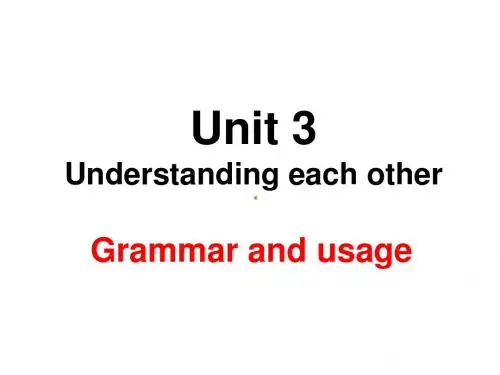
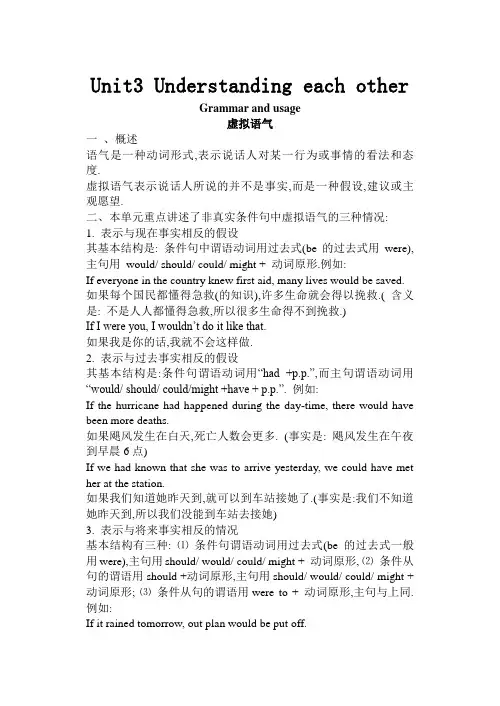
Unit3 Understanding each otherGrammar and usage虚拟语气一、概述语气是一种动词形式,表示说话人对某一行为或事情的看法和态度.虚拟语气表示说话人所说的并不是事实,而是一种假设,建议或主观愿望.二、本单元重点讲述了非真实条件句中虚拟语气的三种情况:1. 表示与现在事实相反的假设其基本结构是: 条件句中谓语动词用过去式(be的过去式用were), 主句用would/ should/ could/ might + 动词原形.例如:If everyone in the country knew first aid, many lives would be saved. 如果每个国民都懂得急救(的知识),许多生命就会得以挽救.( 含义是: 不是人人都懂得急救,所以很多生命得不到挽救.)If I were you, I wouldn’t do it like that.如果我是你的话,我就不会这样做.2. 表示与过去事实相反的假设其基本结构是:条件句谓语动词用“had +p.p.”,而主句谓语动词用“would/ should/ could/might +have + p.p.”. 例如:If the hurricane had happened during the day-time, there would have been more deaths.如果飓风发生在白天,死亡人数会更多. (事实是: 飓风发生在午夜到早晨6点)If we had known that she was to arrive yesterday, we could have met her at the station.如果我们知道她昨天到,就可以到车站接她了.(事实是:我们不知道她昨天到,所以我们没能到车站去接她)3. 表示与将来事实相反的情况基本结构有三种: ⑴条件句谓语动词用过去式(be 的过去式一般用were),主句用should/ would/ could/ might + 动词原形, ⑵条件从句的谓语用should +动词原形,主句用should/ would/ could/ might + 动词原形; ⑶条件从句的谓语用were to + 动词原形,主句与上同. 例如:If it rained tomorrow, out plan would be put off.假如明天下雨,我们的计划就得推迟. (最近天气很好.) (条件从句中的谓语动词用过去式,表示说话人认为下雨的可能性不大, 而如果用一般现在时的话,则表示说话人认为下雨的可能性很大)If he should see me, he would tell me.假如他看见我,就会告诉我. ( 用should + 动词原形强调一种有偶然实现的可能性,其现实性比用were to + 动词原形大, 比过去式+ 动词原形小)If he were to come, what should we say to him?假如他来了, 我们对他说什么呢? (用were to +动词原形比较正式,多用于书面语中, 表示实现的可能性很小)拟条件句和混合虚拟条件句.1. 单一虚拟条件句单一虚拟条件句指主句和从句与同一时间的事实相反的虚拟条件句. 例如:If it should rain tomorrow, the race would be put off.(主从句与将来事实相反) 如果明天下雨,比赛将推迟.If you had been more careful, you would have passed.( 主从句与过去事实相反) 如果你再仔细些,你就会通过的.If it were not for the leaning tower, the city of Pisa wouldn’t be so famous.如果没有斜塔的话,比萨城也不会这么有名.( 主从句与现在事实相反)2. 混合虚拟条件句很多情况下,从句和主句并不与同一时间的事实相反.例如:If you had followed my advice, your English would be much better.如果当时你听了我的话,现在你的英语就会好多了.( 从句与过去事实相反,主句与现在事实相反)If he weren’t a kind-hearted man, he wouldn’t have helped such a man as you that day.如果不是他这人很好心的话, 那天他决不会帮助一个像你这样的人的.( 从句是与现在情况相反的假设,主句表示与过去事实相反的假设.)If it had n’t been for you, I would have to make another trip there tomorrow.如果不是你的话, 我明天还要再走一趟.( 从句与过去事实相反,主句与将来事实相反.)注意: 在正式文体中,虚拟条件句的从句部分如果含有were, should 或had, 可将if省略,再把were, should 或had 移到从句句首,实行倒装.例如:Were it to rain tomorrow, we would delay our trip.如果明天下雨,我们将推迟旅行.Had you attended the party, you would have met Jack.如果你参加了聚会,你会见到Jack 的.Should I get a rise, I would treat you to whisky.如果我能涨工资,就请你喝威士忌.TaskWriting a letter to explain cultural misunderstandings●Teaching objectives:1.learn about taboos in different cultures and understand what theycan do or cannot do when they are in contact with people from different backgrounds2.learn to complete a text by listening3.review the ways to ask questions4.write a letter of an apology to explain misunderstandings●Teaching focus and difficulties:1.writing down answers2.writing a letter to explain misunderstandingsTeaching methods:1. Listening, reading and thinking to get students to understand the text.2. Pair discussion and group discussion to get students to participate in the classroom activities.●Teaching aids:The multimedia●Teaching procedures:●Step 1 Skills building 1: completing a textTips on completing a text by listening:1. Make sure you read the text first so you understand the subject of the text and the type of words that you are likely to hear.2. Try to guess the words that might be used to fill in the blanks.3. Look for clues in the sentences and in the words before or after the blanks.4. Decide if it is content words or grammar words that you are listening for.Step 2 ListeningYour school has some visitors from abroad. Your headmaster asked you and your classmate to show the guests around. Something puzzled you during the trip. Listen to the conversation between you and your classmate, and complete your diary entry on page 42.Step 3 ReadingA few days after you and your classmate had taken the visitors around Beijing your classmate found this article in a magazine. Circle the taboos that help explain some of the strange incidents that happened when you showed the visitors around.Suggested answers➢If you are from India, you may not eat beef because of your religion.➢If you are from the West, you probably would not like to eat chickens’ feet.➢In India, it is impolite to shake hands or give someone something with your left hand.➢Remember not to just put the business cards in your pocket without looking in Japan .Step 4 ListeningYou want more information about cultural habits, so you go to one of your teachers, who has traveled to the USA and Japan, for help. Listento your teacher and fill in the blanks in your notes below.Step 5 Skills building 2: asking questionsWhen we want to find out about something, we need to ask questions. We can use questions beginning with the following words:What – when we want to find out about something specific.How – when we want to find out the way something should be done. Which – when we want to specify which one of a choice of possibilities.When - when we want to inquire about time.Why - when we want to find out a reason.Where - when we want to find out about the place in which something happened.Step 6 PracticeYou want to ask your classmate about the following things. Form your questions with the correct question words first, and then find a partner to answer questions. Answers can be found in the magazine article on page 43. Take turns asking questions.Suggested answers1. What food do the people from India not eat?2. Which hand shouldn’t be used to shake hands with or give things to people from India?3. What do Japanese people have to buy when they travel anywhere?4. What should you do when a Japanese person gives you a business card?5. What does the OK sign mean for Japanese people?6. Why do people from the USA do not like crowded places?Step7 Skills building 3: writing a letter of apologyWhen writing a letter of apology, you need to include the following:⏹your address⏹the date⏹an opening⏹the purpose of the letter should be given in the first sentence.⏹an explanation⏹ a closing phrase (to apologize again)⏹your name and signatureStep8 PracticeYou want to write a letter of apology to the foreign visitors to explain misunderstandings. Find a partner and discuss what to include in the letter. Each person should write a different part.。
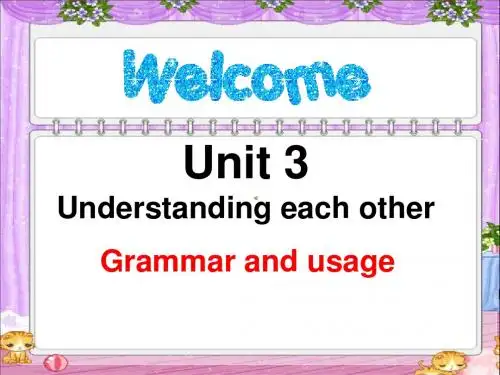
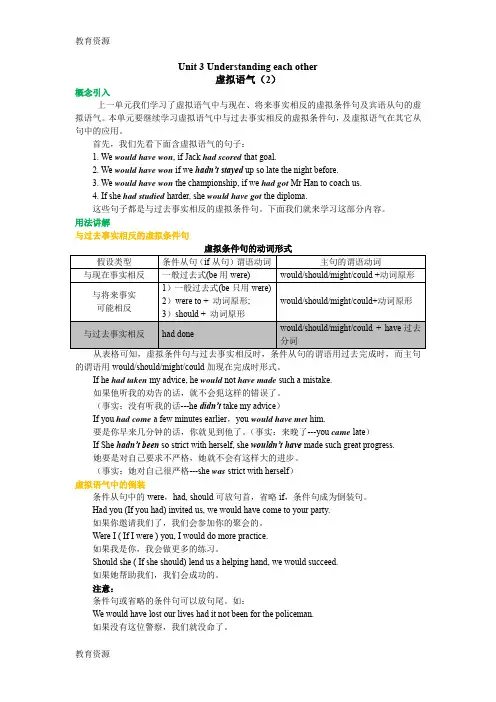
Unit 3 Understanding each other虚拟语气(2)概念引入上一单元我们学习了虚拟语气中与现在、将来事实相反的虚拟条件句及宾语从句的虚拟语气。
本单元要继续学习虚拟语气中与过去事实相反的虚拟条件句,及虚拟语气在其它从句中的应用。
首先,我们先看下面含虚拟语气的句子:1. We would have won, if Jack had scored that goal.2. We would have won if we hadn’t stayed up so late the night before.3. We would have won the championship, if we had got Mr Han to coach us.4. If she had studied harder, she would have got the diploma.这些句子都是与过去事实相反的虚拟条件句。
下面我们就来学习这部分内容。
用法讲解与过去事实相反的虚拟条件句从表格可知,虚拟条件句与过去事实相反时,条件从句的谓语用过去完成时,而主句的谓语用would/should/might/could加现在完成时形式。
If he had taken my advice, he would not have made such a mistake.如果他听我的劝告的话,就不会犯这样的错误了。
(事实:没有听我的话---he didn’t take my advice)If you had come a few minutes earlier,you would have met him.要是你早来几分钟的话,你就见到他了。
(事实:来晚了---you came late)If She hadn’t been so strict with herself, she wouldn’t have made such great progress.她要是对自己要求不严格,她就不会有这样大的进步。
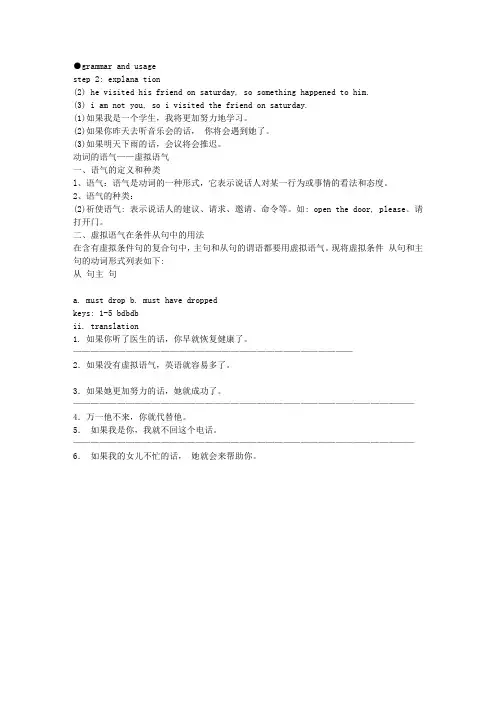
●grammar and usagestep 2: explana tion(2) he visited his friend on saturday, so something happened to him.(3) i am not you, so i visited the friend on saturday.(1)如果我是一个学生,我将更加努力地学习。
(2)如果你昨天去听音乐会的话,你将会遇到她了。
(3)如果明天下雨的话,会议将会推迟。
动词的语气——虚拟语气一、语气的定义和种类l、语气:语气是动词的一种形式,它表示说话人对某一行为或事情的看法和态度。
2、语气的种类:(2)祈使语气: 表示说话人的建议、请求、邀请、命令等。
如: open the door, please。
请打开门。
二、虚拟语气在条件从句中的用法在含有虚拟条件句的复合句中,主句和从句的谓语都要用虚拟语气。
现将虚拟条件从句和主句的动词形式列表如下:从句主句a. must dropb. must have droppedkeys: 1-5 bdbdbii. translation1. 如果你听了医生的话,你早就恢复健康了。
————————————————————————————————2.如果没有虚拟语气,英语就容易多了。
3.如果她更加努力的话,她就成功了。
———————————————————————————————————————4.万一他不来,你就代替他。
5.如果我是你,我就不回这个电话。
———————————————————————————————————————6.如果我的女儿不忙的话,她就会来帮助你。
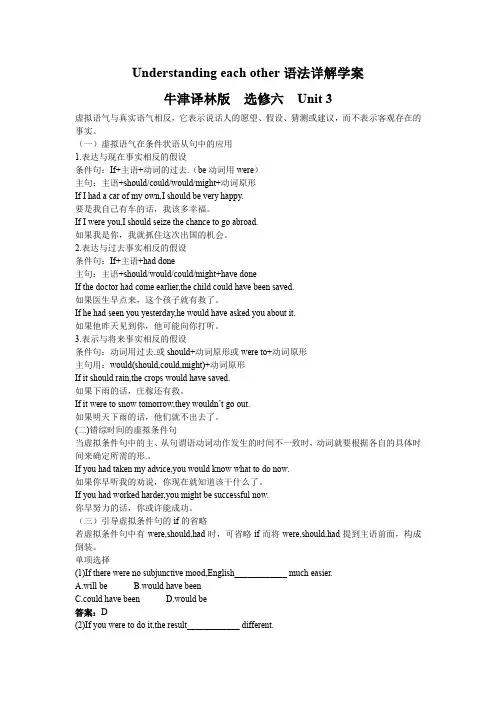
Understanding each other语法详解学案牛津译林版选修六Unit 3虚拟语气与真实语气相反,它表示说话人的愿望、假设、猜测或建议,而不表示客观存在的事实。
(一)虚拟语气在条件状语从句中的应用1.表达与现在事实相反的假设条件句:If+主语+动词的过去.(be动词用were)主句:主语+should/could/would/might+动词原形If I had a car of my own,I should be very happy.要是我自己有车的话,我该多幸福。
If I were you,I should seize the chance to go abroad.如果我是你,我就抓住这次出国的机会。
2.表达与过去事实相反的假设条件句:If+主语+had done主句:主语+should/would/could/might+have doneIf the doctor had come earlier,the child could have been saved.如果医生早点来,这个孩子就有救了。
If he had seen you yesterday,he would have asked you about it.如果他昨天见到你,他可能向你打听。
3.表示与将来事实相反的假设条件句:动词用过去.或should+动词原形或were to+动词原形主句用:would(should,could,might)+动词原形If it should rain,the crops would have saved.如果下雨的话,庄稼还有救。
If it were to snow tomorrow,they wouldn’t go out.如果明天下雨的话,他们就不出去了。
(二)错综时间的虚拟条件句当虚拟条件句中的主、从句谓语动词动作发生的时间不一致时,动词就要根据各自的具体时间来确定所需的形.。
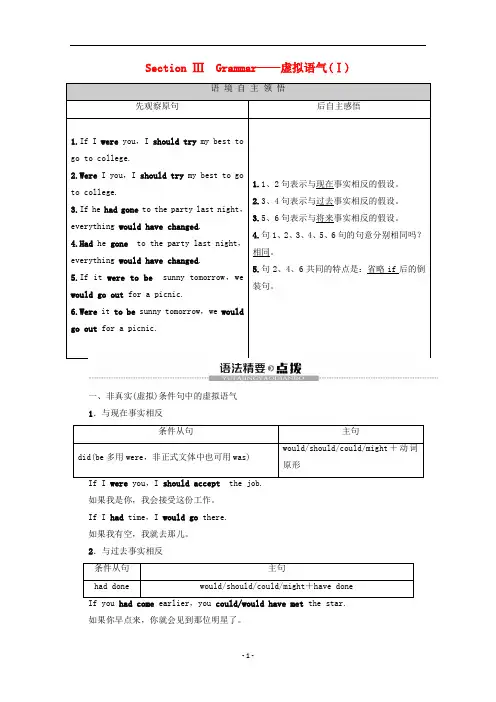
Section ⅢGrammar——虚拟语气(Ⅰ)语境自主领悟先观察原句后自主感悟1.If I were you,I should try my best togo to college.2.Were I you,I should try my best to goto college.3.If he had gone to the party last night,everything would have changed.4.Had he gone to the party last night,everything would have changed.5.If it were to be sunny tomorrow,wewould go out for a picnic.6.Were it to be sunny tomorrow,we wouldgo out for a picnic.1.1、2句表示与现在事实相反的假设。
2.3、4句表示与过去事实相反的假设。
3.5、6句表示与将来事实相反的假设。
4.句1、2、3、4、5、6句的句意分别相同吗?相同。
5.句2、4、6共同的特点是:省略if后的倒装句。
一、非真实(虚拟)条件句中的虚拟语气1.与现在事实相反条件从句主句did(be多用were,非正式文体中也可用was)would/should/could/might+动词原形如果我是你,我会接受这份工作。
If I had time,I would go there.如果我有空,我就去那儿。
2.与过去事实相反条件从句主句had done would/should/could/might+have done如果你早点来,你就会见到那位明星了。
If he had seen you yesterday,he would have returned you your book.如果他昨天见到你,他就会还给你书的。
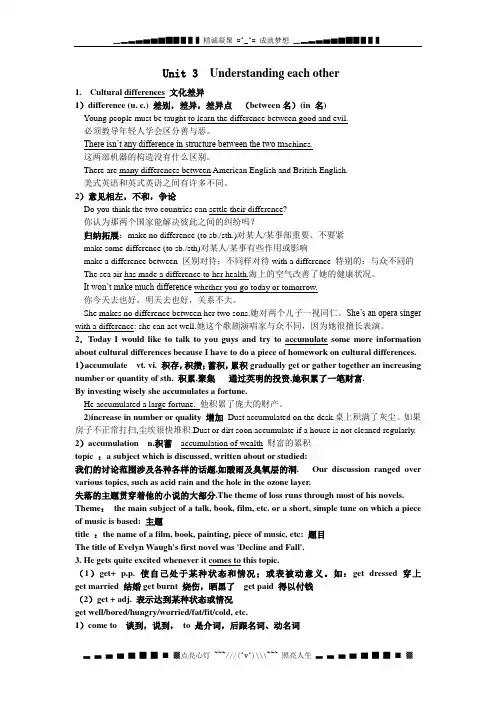
Unit 3 Understanding each other1.Cultural differences 文化差异1)difference (u. c.) 差别,差异,差异点(between名)(in 名)Young people must be taught to learn the difference between good and evil.必须教导年轻人学会区分善与恶。
There isn’t any difference in structure between the two m achines.这两部机器的构造没有什么区别。
There are many differences between American English and British English.美式英语和英式英语之间有许多不同。
2)意见相左,不和,争论Do you think the two countries can settle their difference?你认为那两个国家能解决彼此之间的纠纷吗?归纳拓展:make no difference (to sb./sth.)对某人/某事部重要、不要紧make some difference (to sb./sth)对某人/某事有些作用或影响make a difference between 区别对待;不同样对待with a difference 特别的;与众不同的The sea air has made a difference to her health.海上的空气改善了她的健康状况。
It won’t make much difference whether you go today or tomorrow.你今天去也好,明天去也好,关系不大。
She makes no difference between her two sons.她对两个儿子一视同仁。
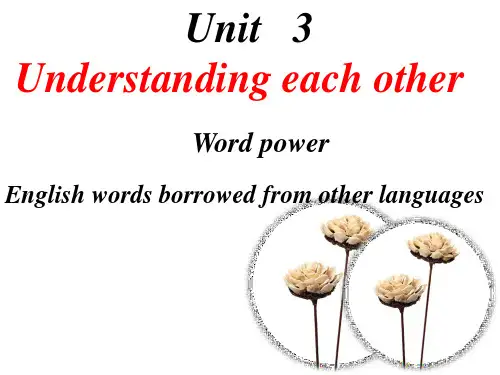
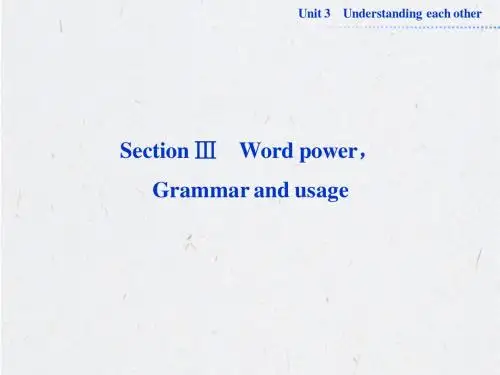
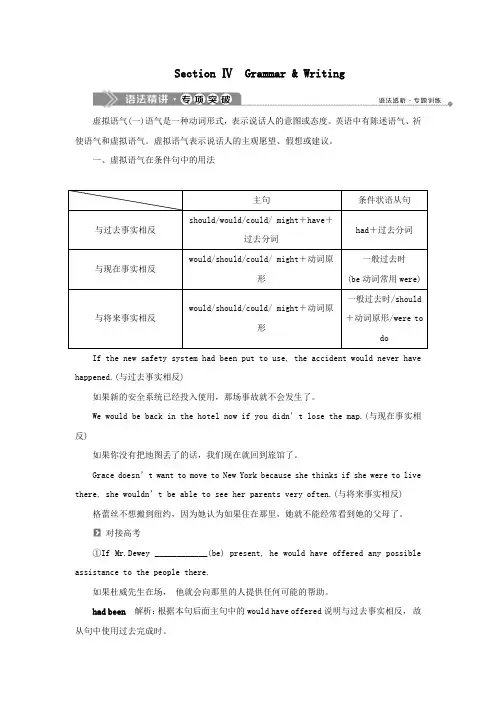
Section ⅣGrammar & Writing虚拟语气(一)语气是一种动词形式,表示说话人的意图或态度。
英语中有陈述语气、祈使语气和虚拟语气。
虚拟语气表示说话人的主观愿望、假想或建议。
一、虚拟语气在条件句中的用法主句条件状语从句与过去事实相反should/would/could/ might+have+过去分词had+过去分词与现在事实相反would/should/could/ might+动词原形一般过去时(be动词常用were)与将来事实相反would/should/could/ might+动词原形一般过去时/should +动词原形/were todoIf the new safety system had been put to use, the accident would never have happened.(与过去事实相反)如果新的安全系统已经投入使用,那场事故就不会发生了。
We would be back in the hotel now if you didn’t lose the map.(与现在事实相反)如果你没有把地图丢了的话,我们现在就回到旅馆了。
Grace doesn’t want to move to New York because she thinks if she were to live there, she wouldn’t be able to see her parents very often.(与将来事实相反) 格蕾丝不想搬到纽约,因为她认为如果住在那里,她就不能经常看到她的父母了。
对接高考①If Mr.Dewey ____________(be) pr esent, he would have offered any possible assistance to the people there.如果杜威先生在场,他就会向那里的人提供任何可能的帮助。
Unit 3 Understanding each other时间为什么能帮助爱?因为只有时间了解爱的价值。
Only time can tellOnce upon a time there was an island where all the feelings lived: Happiness,Sadness,Knowledge,and all the others,including Love.One day it was announced to all of the feelings that the island was going to sink tothe bottom of the ocean.So all the feelings prepared theirboats to leave.Love was the only one that stayed.She wanted to preservethe island paradise until the last possible moment.When the island was almost totally under,Love decided it was time to leave.She began looking for someone to ask for help.Just then Richness was passing by in a grand boat.Love asked,“Richness,can I come with you on your boat?”Ric hness answered,“I'm sorry,but there is a lot of silver and gold on my boat and there would be no room for you anywhere.”Then Love decided to ask Vanity for help who was passing by in a beautiful vessel.Love cried out,“Vanity,help me please!”“I ca n't help you,”Vanity said,“You are all wet and will damage my beautiful boat.”Next,Love saw Sadness passing by.Love said, “Sadness,please let me go with you.”Sadness answered,“Love,I'm sorry,but,I just need to be alone now.”Then,Love saw Happiness.Love cried out,“Happiness,please take me with you.”But Happiness was so overjoyed that he didn't hear Love calling to him.Love began to cry.Then,she heard a voice say,“Come Love,I will take you with me.”It was an elder.Love felt so blessed and overjoyed that she forgot to ask the elder his name.When they arrived on land the elder went on his way.Love realized how much she owed the elder.Love then found Knowledge and asked,“Who was it that helped me?”“It was Time,”Knowledge ans wered.“But why did Time help me when no one else would?”Love asked.Knowledge smiled and with deep wisdom and sincerity,answered,“Because only Time is capable of understanding how great Love is.”[阅读障碍词]1.preserve v.保护;保持2.grand adj.宏伟的;豪华的3.vanity n. 虚荣,浮华4.overjoyed adj.欣喜若狂的5.sincerity n. 真挚,诚心诚意6.capable adj.能干的;有才能的[诱思导读]阅读短文,回答下列问题。
感顿市安乐阳光实验学校虚拟语气虚拟语气是一种动词形式,常用于表示愿望,假设,怀疑,猜测,建议等含义,或与客观事实不符。
一、虚拟条件句:条件状语复合句是非真实情况。
如:1、与现在事实不一致:If it rained, I would not be here now.If I _____ (be) you, I ____________ (work) hard at such important point of your life.2、与过去事实不一致:If the doctor had come last night, the boy would have been saved.If I________ (study) hard, I ________________ (not fail) in the exam last term.3、与将来事实不一致:If it should rain tomorrow, we would stay at home.If you missed the film tonight, you would feel sorry.If I____________/_____________/_______________ (go) to the moon one day, I could see it with my own eyes.注意:1、If条件从句不可出现“would”。
2、“混合虚拟”,即主、从句时间不一致,分别根据句中的时间状语,遵守句型表格。
如:If you had asked your teacher yesterday, you would have no questions now.If you _________ (follow) the doctor’s advice, you ____________ (come) home from the hospital tomorrow.If you _________ (work) hard now, you ___________ (have) a bright future later on.3、If的省略:if从句中如果出现were, had(助动词), should,可省去if,将主语与这些词倒装,例如If the doctor had come last night, the boy would have been saved. =Had the doctor come last night, the boy would have been saved.If I were to go to the moon one day, I would see it with my own eyes. =___________________________________If it should rain tomorrow, we would stay at home.=___________________________________二、名词性虚拟语气:在表示命令、建议、要求、惊叹时的名词性从句中,用(should)do,如:We insisted/ suggested that the meeting should not be held. (_____从句)It was required that the crops ___________(harvest) at once.(_____从句)The recommendation that he ________(invite) was rejected. (_____从句)Their demand is that their wages_______ (increase). (_____从句)常用(should) do虚拟的动词及相应名词:动词:advise, command, order, require, demand, request, insist, propose, suggest名词:advice, command, order, requirement, demand, request, insistence, proposal, suggestion常见句型:1.It is v-ed that …It is suggested that she (should) take your advice.It is required that you (should) not eat too much.2. 名词后接的同位语从句中:Do you know the order has come that no one ______ absent?He put forward the proposal at the meeting that those diaries (should) be well kept.3. The +n.+ is/ was that…My request is that everyone (should) come early next morning.注意:当insist作“坚持认为、强调说”时,或当suggest作“暗示、表明”时,其后宾语从句不能用虚拟语气,如:Jane’s pale face suggested that she _____ (be) ill, and her parents suggested that she _____(have) a medical examination.The man insisted that he _____ (be) not a thief and that he_____________(set) free.三、其他特殊句型1. It is important /strange/natural/necessary/a pity/a shame that …(should) doIt’s important that everyone should know these rules. It’s necessary that he _____________ (send) there at once.It’s very strange that she _______________ (leave) without a word.2. wish,If only/How I wish…用虚拟语气表示一种不可能实现的愿望。
Unit 3 Understanding each other. 虚拟语气(I)(知识梳理)Unit 3 Understanding each other虚拟语气(1)概念引入动词的语气表示说话人的态度和看法,可分为陈述语气、祈使语气和虚拟语气。
1. 陈述语气用来陈述事实或可能发生的事,有肯定、否定、疑问和感叹等形式。
Aileen showed great concern about you. 艾琳很为你担心。
(肯定)My legs were so weak that I could hardly stand. 我的腿软得简直不能站立。
(否定)Would you care to come and stay with me over the weekend? (疑问)你愿意来和我过周末吗?2. 祈使语气用来提出请求、发出命令、警告、威胁、叮嘱、祝福、建议等。
Enjoy yourselves with your trip. 一路愉快。
(叮嘱)Don’t let this type of things happen again. 别让这种事再次发生。
(警告)3. 虚拟语气是说话人为表达一种假设, 或一种主观愿望, 即认为动词所表示的动1. 真实条件句与虚拟条件句:条件句分成两种,一种是真实条件句,一种是非真实条件句。
真实条件句用陈述语气,所做的假设,说话人认为是可以实现的,或者与事实相符的;而使用虚拟条件句时,说话人知道所做假设与事实不符,或者很可能无法实现的。
如:If I have enough money, I will go to the zoo with you.如果我有足够的钱,我会和你一起去动物园。
(暗含“我看看钱是否够,如果够我就去”)If I had enough money, I would go to the zoo with you.如果我有足够的钱,我会和你一起去动物园。
(暗含“我事实上没有足够的钱,没法和你去”)2. 虚拟条件句的构成:假设类型条件从句(if从句)谓语动词主句的谓语动词与现在事实相反一般过去式(be用were)would/should/might/could +动词原形与将来事实可能相反1)一般过去式(be只用were)2)were to + 动词原形3)should + 动词原形would/should/might/could+动词原形与过去事实相反had donewould/should/might/could + have+过去分词(注:与过去事实相反的用法将在下个单元学习。
Unit 3 Understanding each other虚拟语气(1)概念引入动词的语气表示说话人的态度和看法,可分为陈述语气、祈使语气和虚拟语气。
1. 陈述语气用来陈述事实或可能发生的事,有肯定、否定、疑问和感叹等形式。
Aileen showed great concern about you. 艾琳很为你担心。
(肯定)My legs were so weak that I could hardly stand. 我的腿软得简直不能站立。
(否定)Would you care to come and stay with me over the weekend? (疑问)你愿意来和我过周末吗?2. 祈使语气用来提出请求、发出命令、警告、威胁、叮嘱、祝福、建议等。
Enjoy yourselves with your trip. 一路愉快。
(叮嘱)Don’t let this type of things happen again. 别让这种事再次发生。
(警告)3. 虚拟语气是说话人为表达一种假设, 或一种主观愿望, 即认为动词所表示的动作或状态并非真实或仅是主观设想时所用的动词形式。
我们先看这些含虚拟语气的句子:1. If you were an artist, what kind of pictures would you paint?2. If you could have three of these paintings on the walls of your classroom, which wouldyou choose?3. If the rules of perspective had not been discovered, no one would have been able to paintsuch realistic pictures.4. Without the new paints and new technique, we would not be able to see the many greatmasterpieces for which this period is famous.5. Have you ever wished you could paint as well as a professional artist?本单元将重点学习if从句的虚拟语气和wish和“suggest”类后的宾语从句中的虚拟语气的用法。
用法讲解if引导的虚拟条件句1. 真实条件句与虚拟条件句:条件句分成两种,一种是真实条件句,一种是非真实条件句。
真实条件句用陈述语气,所做的假设,说话人认为是可以实现的,或者与事实相符的;而使用虚拟条件句时,说话人知道所做假设与事实不符,或者很可能无法实现的。
如:If I have enough money, I will go to the zoo with you.如果我有足够的钱,我会和你一起去动物园。
(暗含“我看看钱是否够,如果够我就去”)If I had enough money, I would go to the zoo with you.如果我有足够的钱,我会和你一起去动物园。
(暗含“我事实上没有足够的钱,没法和你去”)2. 虚拟条件句的构成:假设类型条件从句(if从句)谓语动词主句的谓语动词与现在事实相反一般过去式(be用were) would/should/might/could +动词原形与将来事实可能相反1)一般过去式(be只用were)2)were to + 动词原形3)should + 动词原形would/should/might/could+动词原形与过去事实相反had done would/should/might/could + have+过去分词(注:与过去事实相反的用法将在下个单元学习。
)If I were a bird, I would fly into the sky. 如果我是只鸟,我要飞向天空。
(“我”不是鸟,也不能飞向天空,所以假设与现在事实相反,从句的be用were,主句用would+动词原形)If it were to rain tomorrow, the meeting would be put off. 如果明天下雨,会议就会延期。
(说话人认为明天不会下雨,要表示“与将来事实可能相反”,从句用were to+动词原形,从句用would+动词原形,因为动词短语put off与主语“会议”有被动关系,用be put off)If there were no gravity, we should not be able to walk.假如没有地心引力,我们就不能行走。
(事实:There is gravity. 与现在事实相反)I would go travelling, if I had lots of money.如果我有许多钱,我会去旅游。
(事实:I don’t have lots of money. 与现在事实相反)If he should see me, he would know me.假如他看见我, 就会认识我。
(事实:He won’t see me. 与将来事实相反)If it were Sunday tomorrow, I might go to see my grandmother. (与将来事实相反)如果明天是星期天,我就去看望我奶奶。
3. 注意:1. 在虚拟语气中,be的各人称形式都用were;在非正式文体中,第三人称单数有时也用was。
但是在If I were you中,不能用was。
2. 在主句中,should只用于第一人称。
3. 如果对正在进行的动作的虚拟,应换为相应的动词的进行时。
If I were not listening to the radio, I would be sleeping.如果我现在不是在听收音机,我会正在睡觉。
(事实是:现在正在听收音机,没在睡觉)4. 主句中would, could, might的意义:If you had another go, you would succeed. 如果你再试一次,你一定会成功。
(would表示必然的结果)If you had another go, you could succeed. 如果你再试一次,你就能成功。
(could表示“能够”)If you had another go, you might succeed. 如果你再试一次,你或许能成功。
(might表示可能的结果)4. 拓展——if onlyif only 意思是“要是......就好了”,后面常加虚拟语气:谓语动词用一般过去时表示目前的愿望,用过去完成时表示过去的愿望,用would或could接动词原形表示将来的愿望。
If only I knew his phone number. 我要是知道他的电话号码就好了。
(与现在事实相反)If only you had come to the get-together. 如果你参加了聚会就好了。
(与过去事实相反)If only she would listen to me carefully. 但愿她会仔细听我讲话。
(与将来事实可能相反)wish后的宾语从句中的虚拟语气wish和hopewish表示“愿望”,而hope表示“希望”。
wish后描述的是人们美好的愿望,很有可能是不能实现的,所以wish就要用虚拟语气,而其虚拟语气是通过宾语从句的谓语动词的变化实现的。
wish 现在时did(be动词用were)希望“同步”发生某事过去时had + done 希望“之前”发生某事将来时couldwould希望“之后”发生某事+ do(1) I wish I were ten years younger. 我希望我能够年轻十岁。
I wish I knew how to drive a car. 真希望我会开车。
(2) I wish I had gone to the football match last night. 我希望昨晚我去看足球比赛了。
(注意:last night表明用had gone)(3) He wishes you would go and visit him. 他希望你会来看他。
I wish the boys could be quiet. 我希望男孩们能保持安静。
注意:从句谓语动词的变化不受wish的时态的影响,无论wish还是wished,我们只需判断从句谓语动作是和wish同步发生,还是在wish前,还是在wish后发生的,就可以了。
不要受前面这个词的变形影响。
试一试:1) I wish I ________a bird. (be)2) I wish/wished I ________ (not eat) so much watermelon.3) The party was terrible, I wish I ________ (never go) to it.4) I wish it ________ (rain) tomorrow.答案与解析:1) were。
现在的愿望,即与wish同步的愿望,用were。
不用was。
说话人吃西瓜吃得肚子都大了,所以一定希望以前没有吃这么多西瓜,2) hadn’t eaten用hadn’t eaten。
3) had never gone。
从前句“晚会太糟糕了”可知,已经去过晚会了,是希望以前没去参加,所以用had never gone。
注意never是副词,一般放在助动词后,一般动词前。
4) would rain。
希望明天下雨,用would rain。
类的宾语从句的虚拟语气“suggest”“suggest”类的宾语从句中谓语用(should)+动词原形。
我们没有学虚拟语气时,老师经常告诉我们suggest作“建议”讲时,从句谓语用“(should)+ 动词原形”。
现在我们知道还有一些词也有这种用法,这些词都表示主观的想法、看法、建议、命令、请求等等,因为是主观给别人的一些建议,所以你不能保证别人按你说的去做,因此属于虚拟的范围。
这些词包括:第一种记法:(disco 迪斯科舞, rap 说唱)D: demand (要求), desire (欲望)I: insist (坚持), idea (看法、注意)S: suggest (v.), suggestion (n.) 建议C: command (命令)O: order (命令)R: require (要求), request (有礼貌的请求), recommend (推荐)A: advise (v.), advice (n.) 建议P: propose (v.), proposal (n.) 提议注意:demand, desire, command, order, request既是名词,也是动词。